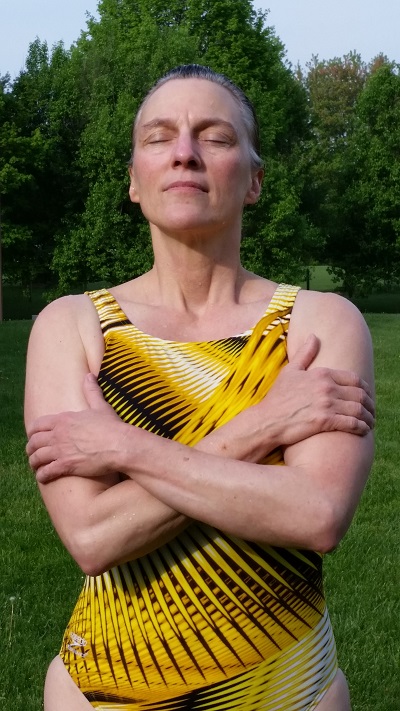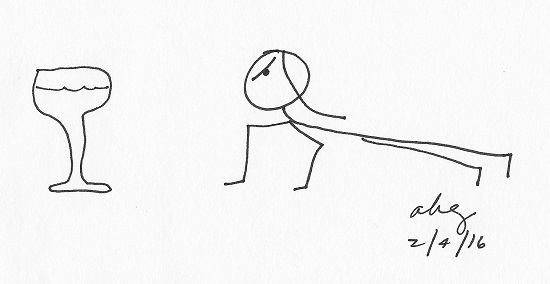If I relapsed today it would be because my terrorizing, brutalizing inner narrative, red hot like a stove burner, made me reflexively jerk my tender inner self away from even another moment of searing pain from that demonic eye.
 Those who’ve had a glass of wine after a long day know warmth spreads down the throat and through the tight shoulders, then into the knotted stomach, easing, easing, easing.
Those who’ve had a glass of wine after a long day know warmth spreads down the throat and through the tight shoulders, then into the knotted stomach, easing, easing, easing.
Wine doesn’t ease me. It takes me to a special place just for the two of us and joins with me in oneness. My fragile little inner self is enfolded and encircled and protected in perfect safety. I can’t be hurt when I am drinking.
As I child, I watched on TV as the monks self-immolated in Vietnam. I saw people can be quietly present even when they are on fire. But one has to train against the human reflex to rescue the self from pain.
Three times since I have been abstinent from alcohol, I entered what I am seeing as the moment-before-the-moment of taking a drink. In those seconds before I might have put the wine to my lips, I was unconscious, without thought. I was in a state of complete, acute, overwhelming, excruciating despair, of such helpless, hopeless, inconsolable desolation. And then, without warning, I was shifted to a state of no-self, all-reflex. Another second and I would have done what instinct, what being human makes me do – rescue myself from pain.
I aspire to being fully present for all of life, and I exercise relentlessly to be fit for life’s pain, especially now I see its potentially ruthless power over me. But I have no holy, sacred, saintly powers. I am plain, earthy Anne. If I’m on fire, I’ll be drinking.
So that’s my job in recovery from addiction. I have to keep myself from getting to that moment-before-the-moment. At the first hint of even a warm ash of discomfort, I’ve got to take action. I need to hold still if I can, run if I have to, even lash myself to the dining room table, anything not to get even one step closer to that kitchen of emotional pain with its hot stove where choice is absent and reflex becomes predictable and inevitable.
Life happens. Pain happens. Three years ago, when I realized I had become addicted to alcohol and began to abstain from it, I wasn’t aware that an inner narrative begins automatically when I feel even the tiniest firing of human distress. “What’s the matter with me that I’m feeling anything whatsoever?! I should be perfectly able to do everything perfectly and handle all situations perfectly without having any needs or wants or emotions at all. I’ve failed! I’m bad, I’m wrong, I should be abandoned by the side of the road, unloved, deservedly dejected! It’s going to happen any moment now! I’ll be banned from all love and all human connection forever! What can I do?! There’s nothing I can do! How could I have let it come to this?!”
Chokes me up to just write that. And this is the tame version, bowdlerized for blogdom. Life happens. Pain happens. Add these sentences that batter me, alarm me, panic me? With my thoughts, I set myself on fire.
It’s not what would happen that would make me drink again. It is what I would tell myself about myself in relation to what happened that would bring me to the point of such suffering that I would have to drink out of mercy for myself.
I should be content
to look at a mountain
for what it is
and not as a comment
on my life.
– David Ignatow
I believe I haven’t relapsed yet because:
1) I got lucky those three times I separated from my self in that moment-before-the-moment dissociated state because someone or something interrupted me.
2) With the professional help of Dr. H., I became able to a) identify the recurrent dark spells of trauma episodes – when they were happening – that took not just my hand but my face, my very identity, to that terrible burner of self-immolation, and b) learn ways to free myself from the trauma spell, however much the effort left me spent and shaking.
3) With the help of professional counselors, teachers such as Kristen Lenz and Lynn Theodose, and writers such as Matthew McKay et al., I have practiced becoming more quielty present for more of life more of the time.
4) With the help of thousands* I have learned to a) become aware of the earliest, tiniest self-talk that is any way unkind to me, b) pause to catch the thought like a hard ball in a catcher’s mitt, c) examine that captured thought and deliberate upon what to do with it, ranging from beating it with a 2′ x 4′ to holding it to my heart as I did fierce Viva, my second husband’s cat, who cowered and panted during thunderstorms, and d) execute. Do it. Do whatever it takes to wrestle, embrace, release the thought – whatever will quench its flames – so that it doesn’t scorch me.
I no longer let any thought in, not a one, that hurts me. I never let down my guard. I scramble, I scrabble, I scrape, I leap, I push, I square off and wait. Never, ever again.
A woman at The Weight Club asked me wistfully the other day, “So, are you at the gym every day?” I think she wanted to know if fitness were an arbitrary gift from arbitrary gods. I said yeah, pretty much every day, except for the days I swim.
“Oh,” she said with relief. “You work at it.”
Oh, my dear. You have no idea.
I do not intend to relapse today.
*I was unable to stop drinking on my own and am supported in staying stopped by thousands in the recovery community, physicians, psychologists, counselors, personal trainers, nutrition consultants, friends, family, colleagues and random strangers, including the Kroger employee who held me like a child when I began to sob uncontrollably from my inability to find the aisle with the recovery-supporting oatmeal.
Photo credit: Tabitha Brown


